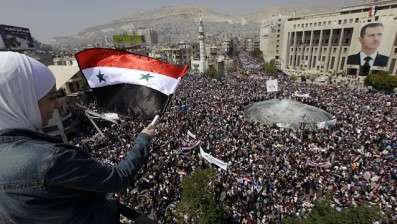
Large demonstrations in support of the Syrian government of President Bashar Al-Assad in Damascus, the capital, on March 29, 2011. The president addressed parliament on March 30 and denounced the foreign plot against the country., a photo by Pan-African News Wire File Photos on Flickr.
Syria calls for emergency Arab League meeting over suspension
Bashar al-Assad's government demands talks after 22-state regional body announces that it will suspend country amid growing violence
Martin Chulov in Beirut guardian.co.uk, Sunday 13 November 2011 13.24 EST
Syria has called for an emergency meeting of the Arab League after the regional body announced it will suspend Damascus from its membership ranks on Wednesday and impose sanctions – a move that has sharply escalated tensions across the region.
The regime of President Bashar al-Assad wants the urgent meeting held before the suspension is due to take effect. Syrian officials made the demand after a night of apparently sponsored violence against the diplomatic missions of states that had voted to punish it because of a crackdown against demonstrators in defiance of an earlier understanding.
On Saturday night, protesters stormed the Saudi Arabian and Turkish embassies in Damascus and the Qatari mission in nearby Beirut, prompting Turkey and Saudi Arabia to withdraw non-essential diplomats and their families.
Turkey has also demanded compensation for damage to its embassy and warned its citizens against travelling across its southern border.
Last month, the US also withdrew its ambassador after the US embassy was twice stormed by a crowd.
The British Foreign Office minister, Alistair Burt, condemned the latest embassy attacks on Sunday. "By allowing these attacks to take place, the Syrian regime is demonstrating yet again that its first response is repression and intimidation," he said. "This cycle of violence must stop now for the sake of the Syrian people and for those who support them."
Turkey called on the international community to stop the bloodshed in Syria, a demand that appeared to leave open the possibility of some kind of intervention.
An unnamed Syrian official told the state news agency Sana on Sunday that Arab League monitors could travel to the country to assess the situation before the suspension is due to take effect on 16 November. Such a concession had been a key demand of the body, which two weeks ago thought it had struck a broad deal with Damascus to end the violence.
However, clashes have intensified since then, with daily death tolls often of more than 20 people, meaning November – the eighth month of the Syrian uprising – is likely to be its bloodiest yet.
A large pro-regime rally saw thousands turn out in central Damascus on Sunday in what was cast as a spontaneous mass display of backing for Assad, whose support base remains stronger in the capital and in the commercial hub of Aleppo than in the third and fourth cities, Hama and Homs. Daily clashes there between troops and protesters underline a deepening divide with ever-sharpening sectarian dimensions.
Syria is ruled by the Assad clan, hailing from the Allawite sect, which has close ties to Shia Islam. The Allawites account for around 12% of all Syrians, but are deeply entwined into the establishment.
Other minorities include Christians, Druze and Kurds. However, the bulk of Syrians are Sunni Muslims, whom the regime fears have drawn strength from successful revolts in the Sunni states of Tunisia, Egypt and Libya.
The effect of Syria's suspension is not yet clear, and neither are the type of sanctions that the Arab League may impose. The organisation's secretary general, Nabil al-Arabi, said on Sunday that he is "studying mechanisms" to protect Syrian people.
He left open the possibility of again referring Syria to the UN security council, where Syrian allies Russia and China last month blocked a move that had threatened to bring security council sanctions. Arabi said the league did not have the means to act alone.
Despite its relative lack of clout, the Arab League move is significant on the global stage, where European and US policymakers had been struggling to craft a means of stopping the violence in Syria without causing a collapse in regional stability.
Without the cover from the Arab League that the US received in March, Barack Obama would have been much less likely to authorise the use of the US military in the early stages of the Libyan operation – an essential element of the ultimately succesful Nato operation.
The move against Syria – only the second of its kind in the history of the 22-state organisation – is likely to embolden states opposed to the regime but fearful of the knock-on effects of the fall of Assad.
Isolation is not sitting well with Assad or Syria's key patron, Iran. Both states have warned of "dire consequences" if more pressure is piled on the regime, and insisted that the relentless protests are foreign-backed and being led by militant Sunni Islamists.
No comments:
Post a Comment